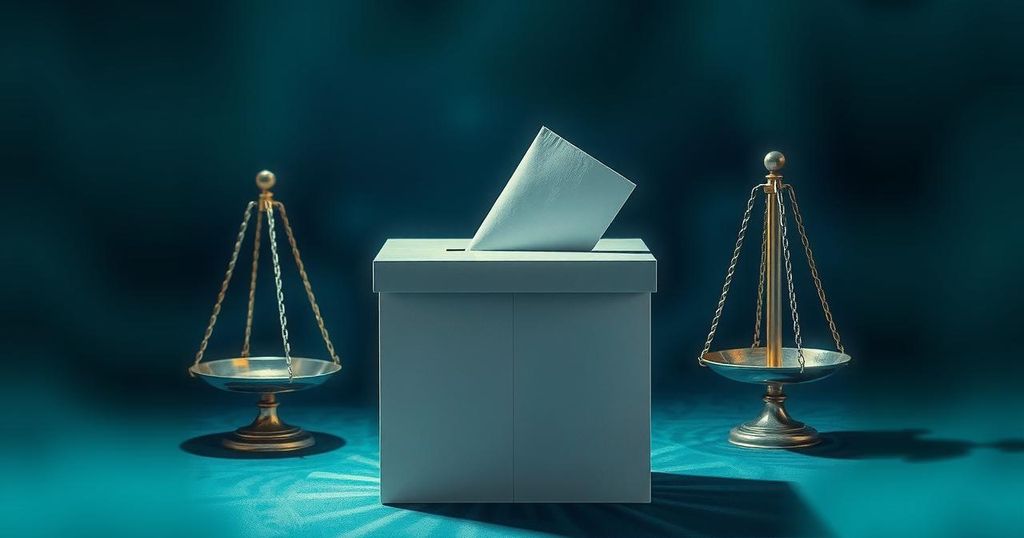Iraq’s Struggle Against Electoral Fraud: Money, Power, and Integrity in 2025 Elections

As Iraq approaches its 2025 parliamentary elections, political factions are divided over electoral amendments, raising concerns about the legitimacy of the electoral process. Allegations of vote-buying and manipulation persist, exacerbated by financial influence and intimidation tactics. Efforts to enhance electoral integrity through reforms face challenges due to external pressures and a lack of enforcement. Proposed changes aim to create a fairer electoral landscape but encounter political resistance and implementation hurdles.
As Iraq prepares for its parliamentary elections in 2025, political factions are embroiled in conflicts over proposed electoral amendments. Divisions within Parliament are jeopardizing reform efforts, with some blocs advocating for stricter voting regulations while others resist changes, heightening concerns about the electoral system’s susceptibility to political influence.
The electoral process in Iraq has been shadowed by allegations of fraud and malpractice for years. Despite assertions from the Independent High Electoral Commission (IHEC) that elections are conducted fairly, numerous opposition voices and international observers continue to report issues related to vote-buying and coercion, which undermine the credibility of election outcomes.
Financial power significantly affects Iraq’s elections, with political parties investing vast resources to influence voter preferences. Reports reveal pervasive vote-buying, especially in lower-income regions. An IHEC-supported study from 2018 indicated that candidates offered financial incentives of $50 to $500 per vote, while rural voters were persuaded through gifts such as food baskets and appliances. The 2021 elections witnessed spending on vote-buying exceeding $250 million.
Despite these practices, electoral results remain unpredictable, fostering disputes over alleged electoral manipulation. The 2021 elections were marked by serious accusations of interference in the electronic voting system. The Patriotic Shiite Movement won 73 seats, while the Al-Fatah Alliance’s representation fell sharply from 48 to 17 seats, provoking strong rejection of the results from its leader, Hadi al-Amiri, who claimed them to be fabricated.
The leader of Asaib Ahl al-Haq, Qais al-Khazali, similarly condemned the elections as “the worst in Iraq’s modern history.” Following these events, al-Sadr directed his parliamentary bloc to resign, distancing himself from what he termed as corrupt political practices and insisting he would abstain from future elections if corruption persisted.
Beyond direct vote-buying, various political factions exploit state institutions for electoral advantages. For instance, in 2021, state-owned media were used for biased coverage, and governmental aid was distributed in exchange for votes. The Ministry of Electricity evidenced this with thousands of temporary employment contracts that were quickly terminated after the election, suggesting employment was leveraged for political gain.
A total of 15,000 land grants were reportedly issued before the 2021 elections, favoring individuals with substantial political connections. Political analyst Aqil al-Fatlawi highlighted the importance of reforms, stating, “Without reforms, elections could produce unfair results that fail to reflect the will of the people.” He emphasized the need for a balanced electoral environment to promote fair opportunities for all candidates.
Threats from armed groups linked to political factions have also arisen in numerous regions, contributing to a climate of intimidation during elections. Human Rights Watch has documented cases of campaign material destruction and violent attacks against candidates, which continued into the 2021 elections, deterring many independent candidates from participating.
The IHEC has faced accusations of political compromise, particularly following grave allegations of fraud in previous elections. A recount in 2018 highlighted significant discrepancies, fostering public skepticism. The 2021 elections also drew scrutiny due to delays and unauthorized access to sensitive election data by political operatives, leading to widespread protests.
Efforts are being made to enhance electoral integrity through reforms such as biometric voter registration, which has increased the proportion of registered voters while reducing fraud opportunities. However, concerns over external pressures remain. Observer Ali al-Tamimi stated, “Biometric systems ensure voters are real, but they don’t eliminate external pressure.”
In an attempt to address vote counting accuracy, Iraq has implemented enhanced electronic tallying systems, resulting in a decrease in disputes. The engagement of international observers has expanded, although experts caution about their limited capacity to enforce electoral integrity. Political expert Haidar al-Kindi remarked that while watchdogs can document violations, they lack enforcement capabilities against fraud occurring outside polling stations.
As the 2025 elections approach, discussions regarding potential electoral system modifications are intensifying. Proposals include adopting an 80/20 or 90/10 model for seat allocation to lessen the dominance of wealthy candidates. However, critics argue that the fundamental issue resides in enforcement and accountability, rather than the electoral system’s structure.
Additionally, suggestions to redraw electoral districts aim to foster localized competition, yet substantial disparities in campaign financing persist across regions. Election expert Saad al-Rawi indicated that while talks on reforms have occurred, political discord has stymied action on amendments.
Analysts emphasize the current parliamentary body’s inefficiency; some suggest dissolving the parliament entirely to enable more effective governance. Abiding by expert guidance in any reforms is vital, ensuring they genuinely benefit the populace. “Reform must be guided by expertise to ensure it serves the people’s best interests,” emphasized Al-Kinani.
In conclusion, Iraq’s electoral landscape is marred by allegations of corruption and intimidation, hindering the democratic process. In light of the 2025 parliamentary elections, significant political divisions and entrenched practices of vote-buying and coercion pose stark challenges to electoral integrity. Despite proposed reforms and increased biometric registration, external pressures remain prevalent. Stakeholder apprehensions regarding the fairness of the upcoming elections highlight the critical need for substantive reforms to ensure representation that genuinely reflects the will of the Iraqi people.
Original Source: shafaq.com








